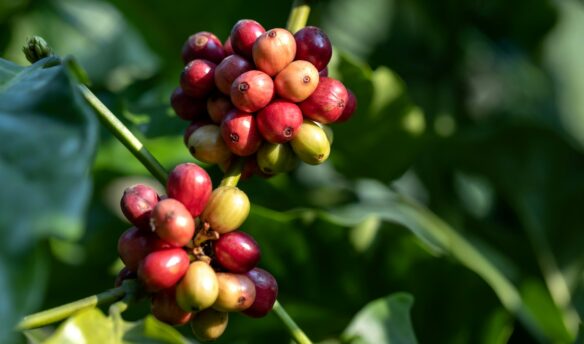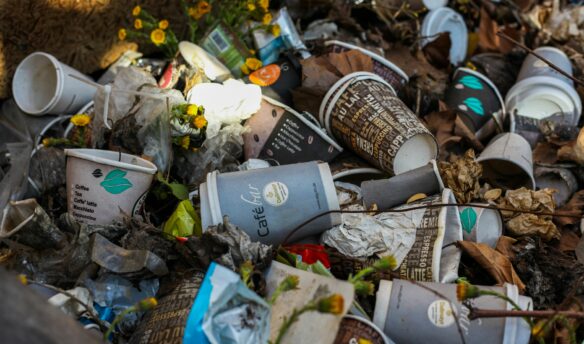In the news this week: Speculators rattle coffee prices, war threatens the Democratic Republic of Congo’s coffee boom, and the Starbucks union gains heavyweight allies.
‘Coffee Nears Record as Speculators Buy on Brazil Crop Fears’ – via Bloomberg
Coffee is no stranger to fluctuations in pricing, but extreme shifts between soaring highs and quick dips can be harmful to farmers and to the industry more broadly. For example, after hitting record highs in February, coffee’s commodity price fell over the next few months as reports emerged that Brazil’s harvest would be better than anticipated.
Now, the industry is facing another hard swing: In August, when Trump’s 50% tariff on Brazil came into force, the C price of coffee began to rise again, increasing 30% over the course of the month. Over the past week, the C price of coffee again spiked above $4, close to record levels. On September 16, the coffee futures market reached $4.24 per pound, just below the all-time high of $4.2995 set in February.
As Ilena Peng and Pratik Parija report for Bloomberg, the already uncertain market has been worsened by speculators—investors who aren’t actually interested in receiving physical coffee. These investors specifically look to cash in on market volatility by buying low and selling high.
Brazil is the world’s largest coffee producer, so what happens in the country heavily influences market activity—right now, Brazil is plagued by uncertainty. The latest data from Brazil shows coffee exports have fallen, especially to the U.S. Meanwhile, forecasts disagree on whether Brazil’s rainy season will be enough to replenish some key coffee-growing regions after a period of drought.
Those lofty prices reached on the 16th were short-lived. On September 18th, Parija wrote another piece for Bloomberg reporting that the C price had fallen 9% in one day, the biggest single day drop since 2008. This, Parija wrote, was caused “as algorithm-driven traders booked profits and the exchange made it more expensive to maintain positions.”
Read the full story on the latest price spike here or via the Spokesman-Review here.
‘U.S. Legislators Introducing Bipartisan Bill to Exempt Coffee from Tariffs’ – via Daily Coffee News
To build on the story above, coffee prices fell even further on Friday as news broke that U.S. legislators planned to introduce a bipartisan bill to exempt coffee from tariffs.
Reps. Don Bacon (R-Nebraska) and Ro Khanna (D-California) have proposed legislation to exempt green and roasted coffee from tariffs. The bill also proposes to exempt beverages containing coffee and coffee byproducts like cascara from being tariffed. The threat of tariffs has upended the coffee industry after being announced in April.
“It doesn’t make sense to put tariffs on something our country does not even grow,” Bacon tweeted. “All it does is raise the cost of coffee for American consumers.”
Following the news, Bloomberg reported that arabica coffee prices fell 6.5%. Robusta futures went down 8.9%. As we mentioned above, one of the reasons coffee prices have been climbing is due to tariffs, which have slowed down imports, particularly from Brazil (again, see above).
Any legislation, assuming it passes the House and Senate, would still need to be signed off on by Trump. Bacon and Khanna hope that, at least, their bill will encourage Trump to exempt coffee himself and bypass the need for legislation. This is something that the White House and the U.S. Commerce Secretary Howard Lutnick have hinted at in the past.
Read more on the latest tariff twists and turns here.
‘Congo Coffee Farmers Fear War Will Undo Recent Gains’ – via Reuters
Coffee production in the Democratic Republic of Congo has recently made a strong comeback after decades of decline. But farmers fear that a new outbreak of violence will jeopardize the industry’s restoration efforts.
Coffee production in the DRC at one point topped 120,000 tons per year. But production collapsed in the 1990s due to a civil war that has continued in some form to this day. In 2010, production was less than 10% what it had been before the war.
Over the last decade, cooperatives and other organizations worked hard to restore production, and international buyers began to take notice. Their efforts paid off: The Best of Congo green coffee competition and auction debuted in 2024, resulting in a record price for a Congolese coffee. The second edition of the competition, which took place this past August, saw multiple coffees score above 88 points.
But now, farmers in the eastern highlands are concerned about their harvests after fighting escalated between government forces and Rwanda-backed rebels in the region. Hundreds have been killed and thousands displaced, including farmers. The fighting has also blocked export routes.
This year’s harvest was good, François Kambale Nzanzu, South Kivu’s agricultural director, told Reuters. But he also says it has been hard to find buyers because of the conflict. “We had a lot of coffee, but there weren’t many exporters this year,” he said.
For some farmers, the instability has been ruinous. Mudekereza Kashugushu Celestin told Reuters that he used to earn $300 a year from his crop, but this year he has only received $50, which has made it difficult to support his family. “There’s nothing left of the coffee I had,” he said. “Even those that remain are already rotten and dry.”
Read more on the plight of Congo’s coffee farmers here.
More News
‘Amid Anti-Greenwashing Directives, EU Coffee Industry Group Provides Guidance’ – via Daily Coffee News
‘Ethiopian Coffee Industry Generates More Than US$2 Billion’ – via Global Coffee Report
‘British Airways Doesn’t Let Their Pilots Drink Coffee In Public’ – via Sprudge
‘30th ASIC Conference on Coffee Science Heads to Lisbon this October’ – via Daily Coffee News
‘Starbucks Named Official Partner of LA28 Olympics’ – via Global Coffee Report
‘Brazil’s Largest Coffee Cooperative Linked to New Slave Labor Cases’ – via Reporter Brazil
The Week in Coffee Unionizing
A coalition of 45 organizations—from labor union federations to political entities—signed a letter urging Starbucks CEO Brian Niccol to finalize a first contract with Starbucks Workers United (SBWU).
The organizations, which collectively represent 85 million people, include high-profile unions like the AFL-CIO, the National Education Association, the American Federation of Teachers, and the American Federation of Government Employees. Political organizations also signed the letter, showing their support for the unionizing Starbucks workers, like Sunrise Movement, Democratic Socialists of America, and the Working Families Party.
“We are writing to impress upon you the importance of making peace with the baristas who make the Starbucks experience what it is and working together with them to finalize fair union contracts”, the letter reads.
Since winning its first union election in late 2021, SBWU has spread across the country. Over 650 Starbucks stores have unionized. Negotiations on a first contract have stalled, however, with both sides blaming the other for the breakdown.
“Starbucks union baristas have inspired people all over the world with their ambitious, hope-filled campaign for a stronger future,” AFL-CIO president Liz Shuler said in a press release. “Now, working people are united in solidarity with union baristas from coast to coast who are organizing their union and fighting for the fair contract they have earned.”
Meanwhile, workers in three states launched a class action lawsuit against Starbucks, accusing the coffee behemoth of violating the law by changing its dress code but refusing to reimburse employees who had to spend their own money to buy code-compliant outfits.
Brooke Allen, one of the plaintiffs, told the Associated Press that she has spent more than $100 to purchase clothes and shoes that fit the new policy. “I think it’s extremely tone deaf on the company’s part to expect their employees to completely redesign their wardrobe without any compensation,” she said. “A lot of us are already living paycheck to paycheck.”
SBWU called for a strike in May, with over 2,000 workers representing 120 stores walking off the job. “This policy change puts the burden on baristas, many of whom are already struggling to get by, to buy new clothes or risk being disciplined,” union organizer Michelle Eisen said at the time.
Starbucks declined to comment on the lawsuit, but told the AP that the dress code change was to offer a more consistent experience to its customers. They also claimed to provide all baristas with two free shirts.
Beyond the Headlines
‘What to Know About Zarfs, the Fanciest Way to Drink Coffee’ by James Doubek
















